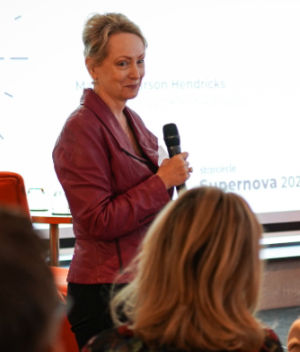
By Marilyn Pearson Hendricks
Co-founder and Managing Partner
WorkTech Advisory Inc.
Anyone working in talent acquisition knows the traditional model is broken. Short-sighted practices and transactional relationships have resulted in an ecosystem in turmoil. Recruiting staff have been laid off in record numbers, and we’re only just starting to see the light at the end of the tech wreck tunnel.
It isn’t the best time to be talking about trends. But that was my task earlier this year at Supernova 2023, an annual one-day conference in Cork, Ireland, organized by Starcircle, the talent sourcing engine. The event was a beautiful blueprint for community: industry leaders, practitioners and solutions providers from TA, HR and tech gathered together to build and strengthen relationships.
We inspired one another and shared practical experiences garnered from the School of Hard Knocks. We reflected on the landscape and collectively concluded that to avoid making the same mistakes – which have seen mass layoffs and TA teams decimated – we need to work smarter and more sustainably.
Here are the three areas I spotlighted, and my calls to action for us all moving forward.
1. Generative AI: Learn as Much as You Can, as Fast as You Can. It’s Too Important to Ignore!

Top of everyone’s agenda is generative AI. We can’t ignore the role it plays or will play, nor can we look upon it as a silver bullet. That was the general consensus and the first point in my address at Supernova 2023. Technology has the power to help slimmed-down teams to do more with less. It’s a fantastic tool that enables efficiencies, frees up time for professionals to work on more valuable tasks and provides unparalleled systems of intelligence.
When it comes to information collection and analysis, the data-driven insights that AI provides are second to none. It has the potential to underpin next-level operations like strategic pipelining, capacity planning and skills-based hiring that will advance the TA function and organizations away from reactive recruitment models toward sustainable paradigms. Yet, as with all catch-all solutions, GenAI must be approached with caution.
At Supernova 2023, Howard Flint, my WorkTech Advisory Inc. co-founder, hosted a panel with three techies from the TA space. Each gave a different perspective, but all cautioned that we mustn’t walk blinkered into AI adoption. It’s a sentiment that I’ve shared for some time. I genuinely believe we are all underestimating how much of an impact it will have on our profession, industry and lives. If we’re not careful, we will merely substitute one set of problems for another.
As the saying goes, with great power comes great responsibility. Yet AI development and adoption are steaming ahead with little to no governance or oversight – it’s coming, but is it coming fast enough? We’re already seeing fallibilities, biases and inaccuracies – so pervasive in existing recruitment practices – being recreated, reinforced and perpetuated on a grand scale.
The only way to temper the current trajectory is for recruiters to upskill. We must ensure we retain the essential humanness and human expertise. At the same time, we have an ethical and moral responsibility to develop ourselves and our roles into ones that are tech-enabled, not AI-led.
2. Skills-Based Hiring: Use This as the Roadmap to our Future.
I’m passionate about the topic of skills-based hiring. It’s a term buzzing about the ecosystem that promises to overhaul the approach to recruiting. It’s a form of organizational innovation that balances business needs with workforce capabilities and capacity and matches it to overall talent supply. We need it because the traditional model isn’t working. The recent mass layoffs and reductions in force are a testament to this.
Moving toward a model that prioritizes capabilities and capacities over traditional assessment criteria like qualifications and experience opens the door to several advantages. At Supernova 2023, Seth Williams, former director and global head of recruiting channels at Google, spoke passionately about harnessing the power of hidden talent with skills-based hiring at the core.
As Seth proffers, if we start to look at people as more than a role and stop matching them to often overly exclusionary job descriptions, we can start opening up the world of work to typically marginalized, under- and unemployed groups. Not only does this create an inclusive recruiting culture, but it also goes a long way toward solving talent shortages over the long term.
Organizational frameworks built around skills-based recruiting can only work if we collectively change mindsets. Growth-at-all-cost operations have fueled the harmful yo-yo hiring and firing pattern so many businesses follow. This latest cycle has hit TA particularly hard, and we’ve seen teams obliterated in response. If we’re to prevent this from happening again, we need to reassess the value we bring.
Do we just want to be paid to play, or do we want to be more? I say we can and should be the change we want to see. We have so much more to offer than our titles suggest. We do so much more than just “acquire” talent. We should aspire to be holistic and strategic people partners to propel the function beyond short-sighted goals and use skills-based hiring as our roadmap.
3. Candidate Experience: Break Away from the Past and Evolve
Just as skills-based hiring can liberate people from the confines of the job, we need to break free of the traditional recruitment-process shackles. Typical workflows and solutions are used too often simply because they save recruiters’ time. Recruiter efficiency is, of course, important. But it shouldn’t be the be-all and end-all – offering good candidate experiences has to be an ongoing precondition.
Today’s workers have different priorities and more opportunities to share their good and bad experiences. Employer review sites like Glassdoor can make or break employers’ reputations. And when it comes to competing for talent in this tight market, no business can afford to neglect the initial stage of the employee lifecycle. The recruitment process is the first contact and first impression any hire has with a potential workplace. It’s our responsibility to make them want to continue their journey or, at the least, become an advocate.
At Supernova 2023, talent acquisition stalwart Larry Kelly, co-founder and director of Attract Wonder, urged us all to take the opportunity to be creative in the recruitment process and inspire candidates to want to engage more and progress through the funnel. As Larry said, the job description, job ad, CV and interview rounds don’t really work for anyone – not the employer and certainly not the candidate. Using candidate feedback as evidence, we should work with and educate leaders on the possibility of creating new experiences.
Innovative candidate experiences are key to building and maintaining relationships between recruiters and candidates. We must break away from the past to reimagine these relationships as more than a simple exchange because, if we’re to move forward and avoid past mistakes, the model has to change to one that’s more empathetic – our ways of thinking and working need to reflect the modern world and today’s talent demands. We need to challenge the status quo. We must evolve.
The Next Evolution of Talent Acquisition is Happening Now
To learn lessons from the recent talent acquisition crisis, we must reflect on the actions that led us there. We’re already starting to see new mindsets and frameworks evolving, and the creation and implementation of innovative technologies. But we must not walk mindlessly into a new set of problems. Let us instead do our homework and learn together as a community.
Only then will we be able to redefine our roles and profession in a much broader way. A way that encompasses skills-based hiring and candidate experience. A way that champions the human touch supported by a combination of artificial intelligence and human expertise. A way that leads to us becoming trusted business partners engaged in smarter, more sustainable and streamlined practices.
Marilyn Pearson Hendricks is co-founder and managing partner of WorkTech Advisory Inc, a global consultancy that helps founders and their leadership teams achieve their revenue and growth goals, specializing in strategic repositioning and full-stack go-to-market. She has over 20 years of senior leadership, strategy, sales, marketing, alliances and subject-matter expert roles in HR SaaS providers.













